Janine Jackson interviewed Free Press’s Yanni Chen about the appellate court TikTok ruling for the December 20, 2024, episode of CounterSpin. This is a lightly edited transcript.
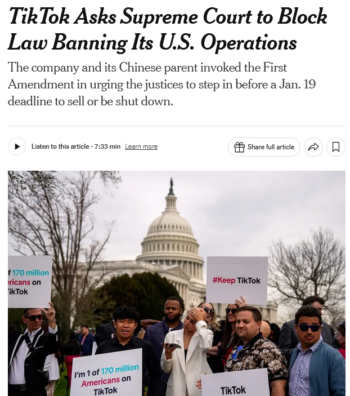
New York Times (12/16/24)
Janine Jackson: As we record on December 18, we’ve heard that the Supreme Court will address TikTok’s challenge to the federal law that was set to ban the platform in the US on January 19, unless they divest from Chinese ownership. The New York Times yesterday noted:
Lawmakers said the app’s ownership represented a risk because the Chinese government’s oversight of private companies would allow it to retrieve sensitive information about Americans, or to spread propaganda, though they have not publicly shared evidence that this has occurred.
A DC Circuit Court of Appeals rejected an earlier challenge from TikTok, ruling that the measure was justified by what were called “grave national security threats.” The judges, the Times reported, were united in accepting the US government’s arguments that “the Chinese government could exploit the site to gain access to users’ data to spread covert disinformation.”
Well, one can practically hear the buzzing in the heads of anyone who has used social media, ever: “Access to our data? No way! Disinformation? You don’t say.” We are in medias res, but what’s at stake, not even so much for TikTok as a company, as for its 170 million US users’—and really everyone’s—ability to access information we want and need, and our rights within those spheres?
Yanni Chen is policy counsel at the group Free Press, who’ve been working on this. She joins us now by phone. Welcome to CounterSpin, Yanni Chen.
Yanni Chen: Thank you so much for having me, Janine.
JJ: The fact that the rhetoric around the TikTok ban relies on phrases like “foreign adversary nation” doesn’t make it sound very 21st century, for a start, but the statement that we aren’t offered evidence that the thing being charged is happening, shouldn’t that at least raise questions about this move, and what else might be going on?
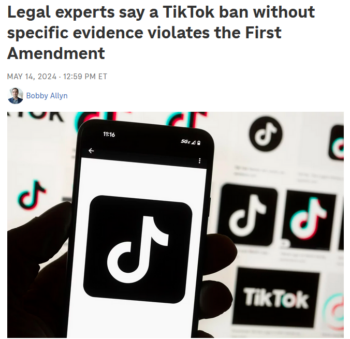
NPR (5/14/24)
YC: I think absolutely, and that’s one thing that we found pretty troubling about the opinion in general. The court goes through and says that either intermediate or strict scrutiny, which are the higher of the two levels of constitutional analysis that is afforded to constitutional claims, applies here. And they say the highest scrutiny that the court applies, strict scrutiny, this law passes that, and then they don’t cite any evidence that the government didn’t provide publicly. They don’t substantiate it.
And so I think one thing that we have trouble with is the idea that the court can find that a law passes strict scrutiny with a clearly viewpoint-based angle, and not provide even a shred of evidence. And this opens up the door for further precedent, for further laws to be put on the books without that kind of substantiation either.
JJ: I’m going to ask you about that viewpoint angle, but I just want to say it early, in case it gets missed: We lose by making this a solely Trump thing. It’s not that he’s not as weird and dangerous as he is, but this TikTok ban, this proposed ban, doesn’t just map neatly onto a Trump agenda, does it?
YC: No, this is a bipartisan bill that passed overwhelmingly on both sides, by both the House and the Senate. I think it was justified mostly by national security concerns, but the committee hearings were closed doors. So the public doesn’t really know exactly what there is.
And as we’ve discussed before, there isn’t much public information to substantiate anything that we’re talking about. There’s no public evidence of the kind of content manipulation that TikTok is being accused of participating in.
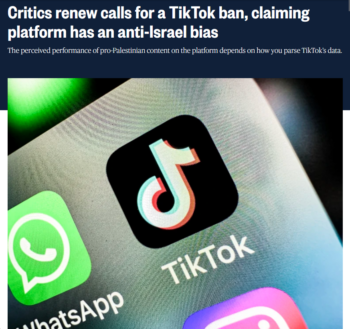
NBC (11/1/23)
JJ: I would just draw you out on that, because the Times report tells me that Judge Sri Srinivasan said, yes, Americans might lose access to an outlet for expression, a source of community and even a means of income, but national security threats, blah blah blah. But then also:
Because the record reflects that Congress’s decision was considered consistent with longstanding regulatory practice and devoid of an institutional aim to suppress particular messages or ideas, [therefore] we are not in a position to set it aside.
And I wanted to hear how you respond to the idea that this has nothing to do with suppressing viewpoints, and it’s consistent with longstanding practice.
YC: Yeah, I’ll take the last one first. What Judge Srinivasan was alluding to with longstanding regulatory history on foreign control in communications, he’s talking about the broadcast space and the FCC. But broadcast and the FCC is kind of a special realm within the First Amendment, justified by bandwidth scarcity, or the amount of waves that are available to be used. So it receives, actually, a different level of First Amendment protection than other fora. So that’s one distinction.
And then also, certainly, the government and regulators can put in place restrictions for foreign control, but that doesn’t mean that they can do it in any way possible. So just because the government has that power with respect to some broadcasting does not mean that they have the power here. Remind me of the first part of that question, too.
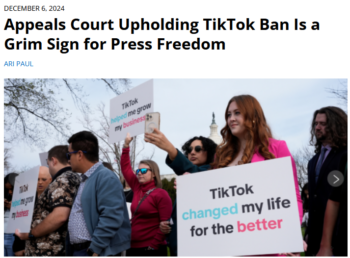
FAIR.org (12/6/24)
JJ: What do we make of Judge Srinivasan’s contention that this conclusion, this ruling, has nothing to do with an institutional aim to suppress particular messages or ideas? Now I think we can all say that it will, in effect, suppress particular messages or ideas, but this is trying to say, well, that’s not what it’s trying to do, so we shouldn’t address it in that way.
YC: Yeah, I think that position requires ignoring a lot of the statements that lawmakers said themselves. You have lawmakers on the record making statements about the type of content that not only TikTok is pushing, but US users are creating, that they take issue with. So you have to ignore all of the statements of the people who wrote the law themselves to get to that position. It’s hard to really swallow.
JJ: The statement that we’re not being offered evidence, actually, that what is being charged is happening—that should raise questions. But also in this context of where, US listeners, we hear all about the free market, the market responds to what people want, so banning an outlet isn’t a thing that should go down easy, generally speaking. And wouldn’t the government need to show that its stated goals could not be achieved any other way, other than banning this outlet? Shouldn’t they have to show that?
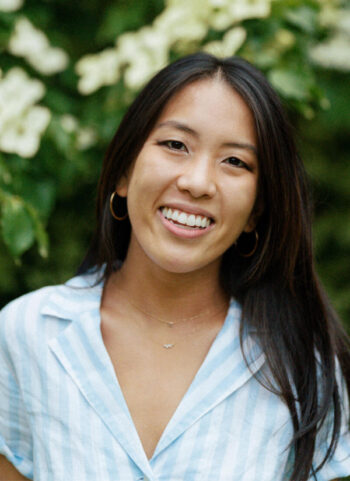
Yanni Chen: “It singles out a single app without really providing any justification why, and then they just say, ‘Congress picked this one.’”
YC: Yeah. So that’s actually the exact requirement of strict scrutiny, is that it needs to be the most tailored, or the narrowest restriction possible, to achieve the need that the government wishes to accomplish. So, yes, I think, formally and on the books, that is the requirement. And I think the application is where you see some problems.
And I think what you’re seeing, also, between the majority opinion’s application of strict scrutiny and Judge Srinivasan’s intermediate scrutiny dialogue, is that I think it is relatively clear that strict scrutiny does apply, because it is clearly a viewpoint-based restriction. It singles out a single app without really providing any justification why, and then they just say, “Congress picked this one.” That’s the definition of speaker discrimination. So you have that, but then you kind of have to do a backend to make it fit strict scrutiny and pass strict scrutiny. So you’re seeing some mental gymnastics happen in that logic.
And then, the other side of that, you have Judge Srinivasan, who says, “No, no, no, this is intermediate scrutiny.” And I think one reason, at least, motivating this is that strict scrutiny is a very high bar to meet, and most laws should not really pass it, just by definition of what that test is. And so having a law on the books that passed strict scrutiny does create risk of that precedent I talked about earlier, of creating bad law, where a flimsy application of strict scrutiny could lead to more laws passing strict scrutiny where they shouldn’t.
So that is one justification for applying intermediate scrutiny, but then making the law fit such that intermediate scrutiny is the right application, or the right test, then it strikes people as odd too, because it doesn’t actually do that. It is a law that requires a strict scrutiny test.
JJ: And I think it’s just weird, as a layperson, to hear, “Oh, we’re not trying to ban TikTok, Tiktok’s fine, we just need them to sell to a buyer that the US approves of.” I just feel like that lands weird, in terms of common sense, to folks.
YC: And that is something that was brought up in the litigation too. TikTok did raise the issue that, functionally, this divestment requirement would be a ban, and it’s kind of dealt with relatively, in a flip manner, in the decision itself. So you have Judge Ginsburg saying, “270 days, there’s plenty of time to meet a divestment requirement.” We just bypass the idea that it is something that you can’t do.
And the court does say, “Well, we can’t let the Chinese government set the standards for our requirements as the US government.” But what we’re talking about is the First Amendment. And the First Amendment applies to what the US government can do to US entities, and its citizens and Americans more broadly.

Free Press (11/2/23)
JJ: It just lands so weird to folks who are accustomed, at this point in 2024, to consuming news from around the world, from not unfettered, but relatively open access to media outlets from different countries, from different perspectives. It just sounds strange.
But part of the reason that this maybe has more legs than it might is that people do see a problem with platforms collecting their data, with using algorithms to push certain messages and to hold back others. And the question has to do with whether a wholesale ban of one platform is really the way to address that, or really how should we address that? If we were really concerned about privacy and targeted disinformation, what are some other responses that we might be looking at?
YC: Yeah, so TikTok is, as you recognize, not the only platform that collects too much data. Meta, certainly Google, other companies track data; they use it, they sell it, they sell it abroad, they sell it here and they sell it to governments. So TikTok is not a unique case.
So I think one thing at Free Press that we advocate for is wholesale data privacy protection, across the market, rather than targeting a single platform, and not only targeting a single platform, but taking it off the market. Because even if your concern is data collection by the Chinese government, in TikTok’s case, the Chinese government can still buy US user data through other intermediaries. So it doesn’t really make sense to cut people off from access from this single source—particularly, as you mentioned, people’s livelihoods depend on this platform, people really generate a sense of community through it—instead of addressing that larger issue. So I think there have been plenty of advocates for federal privacy law that is broadsweeping, but we can’t seem to get congressional momentum on that, where we can on a law that is, in at least some part, rooted in xenophobia.
JJ: And sinophobia, absolutely, which I think we’re going to be dealing with, anti-China—not “going to be dealing with,” we already are. Everything China is bad. It has a very musty feel about it, and I feel we’re in for a lot more of it.
YC: Yeah.
JJ: Finally, it feels a little bit like flailing. It feels a little bit like closing the barn door after the horses are out.
I mean, technology allows us to find news sources. Humanity makes us care about people, even if they are designated “official enemies.” Curiosity impels us to learn about what’s going on beyond our shores, and judgment helps us see what is weird disinformation, and what is news we can use. So the moment feels like people are far out in front of corporations and politicians. And I just want to ask you, finally, what hopeful thoughts you have about this.
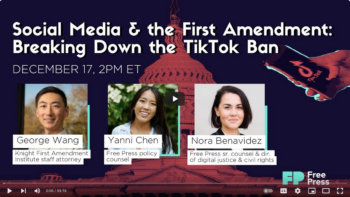
Free Press (YouTube, 12/17/24)
YC: Hopeful thoughts? I mean, I do think that what you mentioned about, from a layman’s standpoint, that this strikes as odd. I do have a lot of hope that it seems like people are understanding that there’s something not right with this decision, and not right with this law. There was something not transparent about it in the first place. This is targeting a specific company, and how it affects our dialogue and our community, so that gives me a lot of hope that people aren’t taking what the court has said here as a wholesale endorsement of the law, and taking it for what it’s worth.
I think that that’s been something that’s really heartening, and I think that it puts the power in the people, and that will be even more important moving forward, where, as you mentioned, information like this is important, and it has a democratic value. And in closing that off here, we put ourselves in line with some of the more repressive governments that do this, and we legitimize that further, as the United States doing this as an example for other countries. So having the civilians, and people who aren’t in government necessarily, sense that there’s something wrong here is definitely heartening.
JJ: All right, then. We’ve been speaking with Yanni Chen; she’s policy counsel at Free Press. They’re online at FreePress.net, and they also have a YouTube channel where you can find their recent webinar on this, breaking down the TikTok ban. Yanni Chen, thank you so much for joining us this week on CounterSpin.
YC: Thank you for having me.
This post was originally published on FAIR.